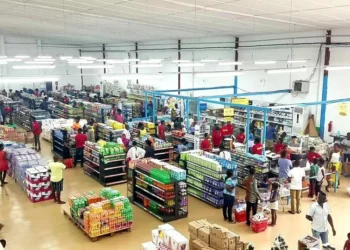Co-Chairman of the Food Trade Coalition Africa, Zair Hamoui, has disclosed that non-tariff barriers pose a threat to the African Continental Free Trade Area (AfCFTA).
According to him, non-tariff barriers will be a major challenge to trading in the continental free trade.This, he explains, will not bode well for the country if various governments ignore the core by stakeholders to deal with it.
Despite this, he expressed confidence in the fact that efforts to remove trade barrier will yield positive results soon.
Speaking at the address of the General Assembly of the Coalition, Mr Hamoui explained that, issues will have to resolved at both the “policy level” and also “practical level”.
These tariff barriers include checkpoints where traders are harassed to pay unapproved charges cross border trading activities.
“The barriers remain whether the internal ones because of the many checkpoints which are leading to long delays and losses… With the actual procedural aspects affecting regional trade, regional trade has not stopped. So, that doesn’t mean that we have free movement of trade across Africa.
“So, we are hoping that with the Food Trade for Coalition Africa, we will be able to tackle this issue as a group in order to interact with the various stakeholders whether the private sector or from the policy sector to create this kind of platform to discuss the issues and to have meaningful policies”.
Opportunities in AfCFTA for Ghanaians
On his part, Deputy Minister for Trade and Industry, Michael Okyere Baafi believes that, with the implementation of the continental free trade area, Africa can make progress in curbing the menace.
Furthermore, he underscored the need for all and sundry to take advantage of the benefit inherent in the trade area.
“It gives opportunity to everybody in Africa, especially in Ghana to take advantage of trading, not only in the year of Agriculture but even other products that are also necessary. Because we are talking about a bigger market of 1.2 million people and we are talking about a combined GDP of $3.4 trillion. I mean this is a big market. So, I guess it is an opportunity for Africans and for that matter Ghanaians to take advantage of this so that we will be able to operate to maximize more from Africa”.
Non-tariff barriers on trade
With the commencement of AfCFTA, the outline envisages the gradual elimination of tariff and non-tariff barriers to trade on the continent. The agreement sets the path for the elimination of tariffs on 90 percent of tariff lines.
Countries can implement tariff reductions over a longer period for 7 percent of tariff lines and maintain existing tariffs for the remaining 3 percent of tariff lines.
According to IMF, this will suffice provided that the value of trade under these does not exceed 10 percent of the total trade with Africa.
For services, member countries have also agreed to propose liberalization through a request-and-offer approach.
This is based on seven identified priority sectors which are logistics and transport, financial services and tourism. It also includes professional services, energy services, construction, and communications.
Read Also: COVID-19 impact on Tourism could cost the global economy US$4 trillion in losses



















